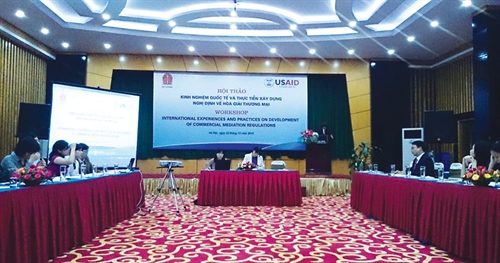Bui Duc Giang
Attorney at law and Ph.D in law[1]
Registration is the most common method of perfecting security interests. On September 1, 2017, the Government issued Decree102/2017/ND-CP on registration of security interests with effect from October 15, 2017 (Decree 102). This long-awaited legal text implementing the 2015 Civil Code contains various new provisions on registration of security this article will try to analyze.
Compulsory registration vs optional registration
Article 4 of Decree 102 makes a distinction between security interests which must be registered and those which may be registered on demand.
As a matter of principle, if a security interest must be registered, its registration will render the security enforceable both against the parties (the secured party and the securing party) and against third parties (subsequent purchasers or incumbrancers, or unsecured creditors). This means that registration constitutes by itself a condition of validity of the security. In contrast, when a security interest may be registered on demand, its registration will ensure only its enforceability against third parties.
Under Article 4 of Decree 102, the following security interests must be registered:
• Charge over a land use right;
• Charge over an asset attached to land where the asset ownership has been certified in the certificate of land use rights and ownership of assets attached to land;
• Pledge or charge of an aircraft;
• Charge over a ship.
The second bullet point is supposed to be in line with Articles 95.4(a) and 95.6 of Land Law 45/2013/QH13 dated November 29, 2013 (the Land Law), pursuant to which registration of change is compulsory in case the land user or owner of assets attached to land that has been issued with a certificate of land use rights and ownership of assets attached to land creates a charge over the land use rights or assets attached to land.
The following security interests may be registered on demand:
• Charges over movable assets (other than those referred to above);
• Charges over future assets;
• Reservation of title in case of purchase and sale of assets attached to land or of future assets attached to land, purchase and sale of an aircraft or a ship, and purchase and sale of other movable assets with reservation of title.
With regard to the third bullet point, it should be borne in mind that reservation of title is a type of security recognized in Article 292 of the 2015 Civil Code[2].
Of note, so far there is no one single register that covers all security interests in Vietnam.
 |
Rach Gia city’s people carry out land registration procedures at the city’s land registry office__Photo: Le Sen/VNA |
Validity and enforceability of security interests under the 2015 Civil Code
The 2015 Civil Code draws a distinction between enforceability against the parties to the security contract (validity against the parties) and enforceability against third parties.
Under Article 310.1, a contract of pledge of property is valid (against the parties) as from the time of being entered into, unless otherwise agreed by the parties or otherwise provided by law.
Likewise, pursuant to Article 319.1, a contract of charge of property is valid (against the parties) as from the time of being entered into, unless otherwise agreed by the parties or otherwise provided by law[3].
Article 297 stipulates “A security interest is enforceable against a third party as from the date of registration or from the time when the secured party obtains or takes possession of the secured property”.
As such, the usual way of perfection of a security interest is its registration with the relevant security registration office[4]. Exceptions to this rule are the cases of pledges and liens. Indeed, a pledge is enforceable against third parties from the time when the pledgee receives delivery of the asset (Article 310.2)[5]. A lien is effective against third parties from the time when the lienee takes possession of the asset (Article 347.2).
Under Article 297.2, once a security interest becomes enforceable against third parties, the secured creditor may exercise its right to recover the secured property and have priority for payment.
Article 308.1 deals with the particular case of competition amongst security interests created over the same asset. It provides that in case an asset is used to secure the performance of several obligations, the order of priority for payment between the secured creditors shall be determined as follows:
• Where all the security interests are enforceable against third parties, priority shall be determined according to the order in which enforceability against parties was established;
• Where certain security interests are enforceable against third parties while others are not, the obligations secured by the security interests which are enforceable against third parties shall be paid first;
• Where all the security interests are not enforceable against third parties, priority shall be determined according to the order in which the security interests were created.
Effective time of registration of security interests
Under Article 5.1 of Decree 102, for registration of security over land use rights, assets attached to land, aircraft or ships, the effective time of registration of the security[6] is the time when the registry officer enters the registered contents into the register whereas in the case of registration of security over movable assets, the registration of the security becomes effective at the time when the contents subject to registration are entered into the security database.
Of note, under Article 95.7 of the Land Law, registration of land use rights and assets attached to land (including registration of security interests over them) is effective from the time of registration into the cadastral register.
As per Article 5.2 of Decree 102, in case of registration of a change[7] due to addition of a security interest and the parties do not enter into a new security contract, or due to addition of a secured obligation but by the time of entering into the security contract, the parties have not agreed that the security would also cover future obligations, then the effective time of the registration of the security interest applicable to the additional asset or additional secured obligation is the time when the registry office enters the changes subject to registration into the register or enters them into the database.
Addition of secured obligations
Pursuant to Article 18.6 of Decree 102, one of the circumstances in which registration of change is required is where the parties agree that the security interest will also cover a new loan but the initial security agreement contained no provisions on pledging or charging the asset as security for future obligations.
Article 23.3 of Decree 102 exempts the parties from registering the change in case of addition of a new secured loan if the following conditions are concurrently met:
• The registered security agreement or loan contract[8] contains provisions on pledging or charging secured assets as security for future obligations;
• There is an addition to the existing secured obligations but not to the existing secured assets; and,
• The parties sign an amendment to the registered security agreement or the loan agreement without entering into a new security agreement.
Of note, all monetary security has officially been recognized by Articles 293 and 294 of the 2015 Civil Code.
Refusal of registration
Article 15 of Decree 102 enumerates cases in which the registry office may refuse to register a security interest. The following grounds for refusal have been added compared to the former legal framework:
• The secured asset being a land use right or house fails to satisfy the conditions to be charged as prescribed in the Land Law or Law on Housing. If the secured asset is a land use right or house subject to a dispute, then the registry office may only refuse to register if there is a document from a competent state agency (i.e., a court) accepting jurisdiction over the dispute or other documents proving that such a competent state agency has accepted jurisdiction to settle the dispute;
• The registry office receives an official letter from an agent of a civil judgment execution office or bailiffs’ office requesting temporary or permanent suspension of registration of the secured asset for which the securing party is a judgment debtor as prescribed by the law on execution of civil judgments;
• The registry office receives an official letter notifying seizure of the secured asset from a civil judgment execution office or bailiffs’ office.
Those grounds are supposed to be in line with the land and housing legislations as well as the law on execution of civil judgments. In particular, under Article 188.1(b) of the Land Law, a land user may create a charge over its land use rights if inter alia the land is not subject to any dispute. Likewise, under Article 118.1(b) of the Law on Housing, the house subject to the charge must not be subject to a dispute. In practice, it has been not easy to define at what state a parcel of land or house is considered subject to a dispute. The first bullet point above helps clarifying this point (i.e., when there is a document from a court accepting jurisdiction over the dispute or other document proving that such a court has accepted jurisdiction to resolve the dispute).
Registration of charges over real property
Decree 102 contains various changes regarding (registration of) charges over real estate.
Under Article 46 of Decree 102, it is possible to transform the registration of a charge over rights arising from a contract for purchase and sale of a future house into (i) a charge over a future house or (ii) a charge over an existing house upon registration of ownership of the latter[9].
Furthermore, Article 64 of Decree 102 appears to recognize charges over investment projects on construction of works other than houses. In this regard, it should be noted that the current law remains unclear on the possibility of creating such charges.
In addition, pursuant to Article 64 of Decree 102, the land registration office is responsible, no later than five working days after the time of registering a security interest being an investment project on construction of houses or investment project on construction of works other than houses, for sending a notice containing certain information to the provincial-level Department of Natural Resources and Environment for the latter to announce the information on its website. The information to be announced includes the name and location of the project, the securing party and secured party, the secured asset(s), and the time of security registration.
Article 59 of Decree 102 provides for the register users’ right to search the register as follows:
• Individuals, legal entities and family households have the right to conduct a search or to request to be provided with information about security interests kept in registers, in a security database and/or the national database on security interests[10].
• People’s courts, people’s procuracies, investigative bodies, civil judgment execution offices and other competent state agencies have the right to request a registry office to provide them with information about security interests in order to serve their specialized operations; and in such cases the provision of information is not subject to payment of fees.-








